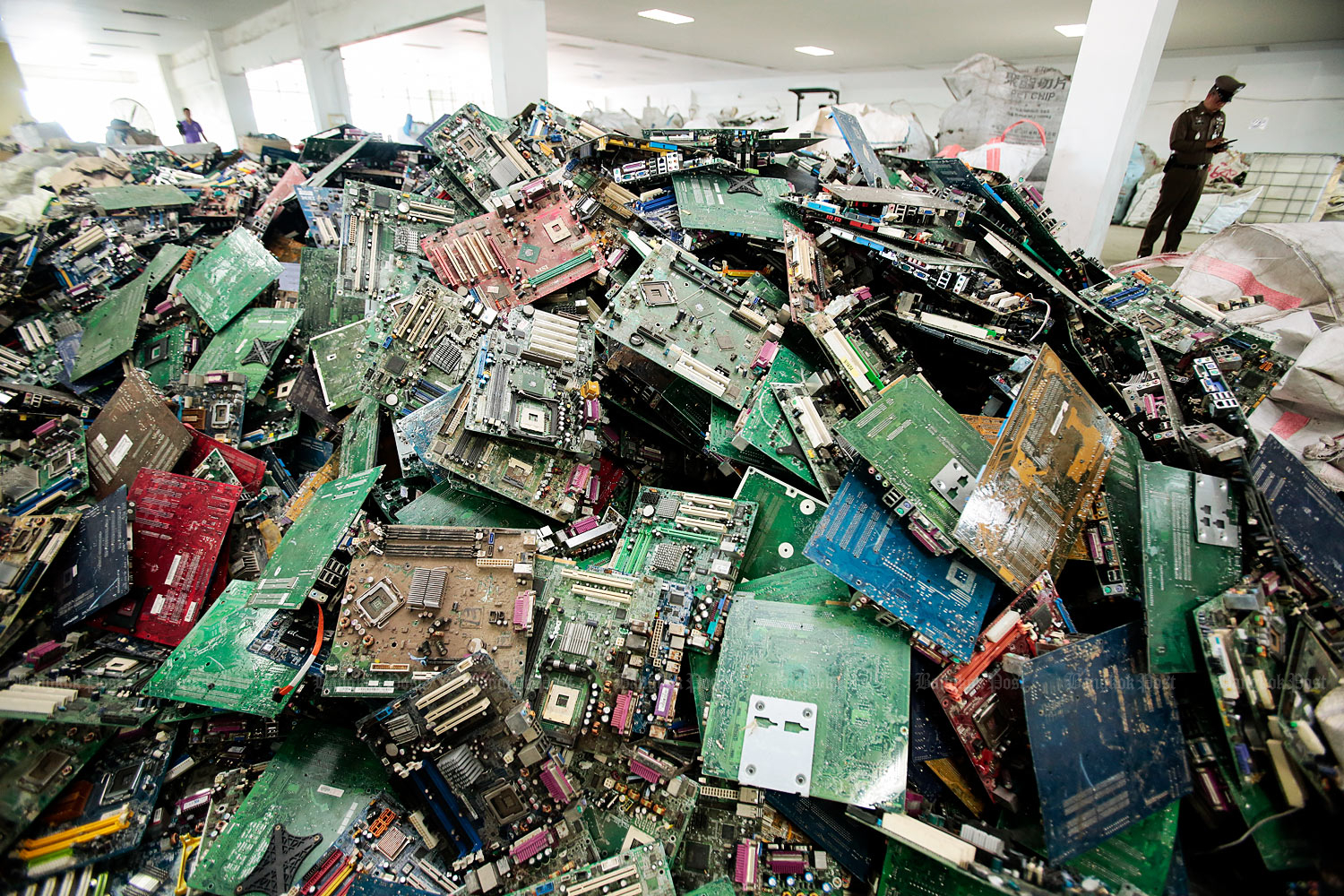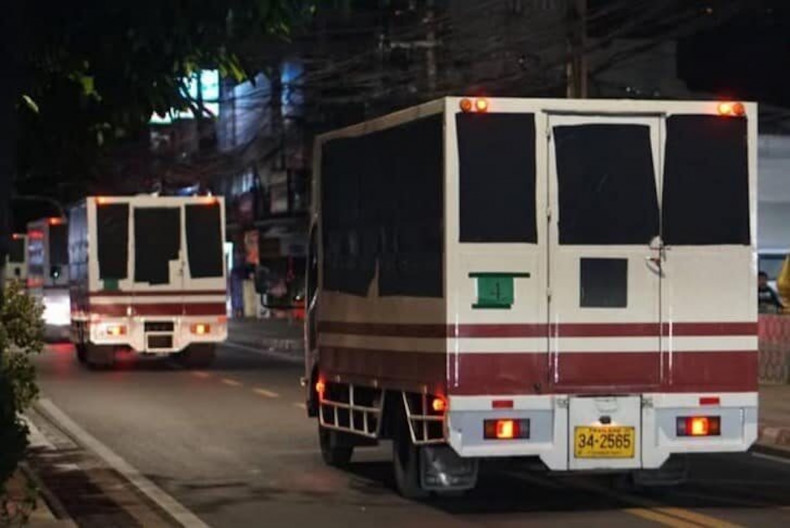The authorities in Thailand have seized 118 tonnes of illegally imported electronic waste (e-waste) from a company located in the free zone of Chon Buri province, spotlighting ongoing efforts to curb hazardous imports and enforce waste regulations. The seizure followed a directive from Industry Minister Akanat Promphan to inspect six containers tied to MHC Group Free Zone Co Ltd at Laem Chabang Port in Chon Buri after a tip-off about suspected illicit e-waste imports. In the containers, investigators uncovered a cargo described as mixed metal scrap sourced from the United States, though the contents also included printed circuit boards. These boards are recognised as hazardous e-waste under the Basel Convention, and are classified as dangerous chemical waste under Thai law. The discovery underscored the potential discrepancy between declared shipments and their actual contents, prompting rapid action from regulatory bodies. The episode has amplified calls for stricter screening procedures and reinforced the commitment of Thailand’s agencies to enforce both international frameworks and national statutes governing hazardous waste. In parallel with the seizure, the Department of Industrial Works ordered that the waste be returned to its country of origin within 30 days, while the Customs Department proceeded with legal actions against those responsible for the offence. This sequence of measures reflects a coordinated approach to address e-waste irregularities, deter future violations, and hold implicated entities accountable under multiple strands of law.
Seizure details and regulatory response
The operational locus of the seizure was Laem Chabang Port, a major gateway for international trade in the region. Six containers from MHC Group Free Zone Co Ltd were scrutinised after information surfaced that suggested illicit importation of e-waste. The inspection was prompted by a tip-off, which led to a structured audit conducted by a coalition of government entities tasked with overseeing industrial activities and environmental compliance. The authorities reported that the cargo in the containers was declared as “mixed metal scrap from the United States.” This declared description formed part of the documentary trail the investigators reviewed as they assessed whether regulatory standards were met and whether any misrepresentation occurred at the point of entry. What elevated the concern was the discovery of printed circuit boards, items categorised as hazardous e-waste under the Basel Convention. The Basel Convention is an international treaty designed to reduce and manage the movement of hazardous wastes across borders, and its relevance here underscores the cross-border implications of improper waste handling. Under Thai law, printed circuit boards are treated as hazardous waste because they contain hazardous materials and can pose environmental and health risks if not properly managed. The juxtaposition of the declared cargo and the found contents therefore generated a compelling case for enforcement action, as it suggested potential non-compliance with both international waste-handling norms and national hazardous-waste regulations.
In response to these findings, the Department of Industrial Works issued a formal directive requiring the waste to be returned to its country of origin within 30 days. This order reflects a legal strategy aimed at ensuring that the questionable material would be removed from the country while authorities conduct further investigations and determine the appropriate disposition of the cargo. In tandem, the Customs Department initiated legal action against the individuals or entities responsible for the importation and misdeclaration of the waste. The combination of a corrective measure (return of the waste) and punitive or corrective legal action (criminal or administrative charges) signals a comprehensive enforcement approach designed to deter similar violations in the future and to reinforce the importance of accurate documentation and compliance with both national and international waste regulations. The immediate outcome thus encompassed a regulatory resolution (return of the material) and a judicial or administrative tracking of culpability, ensuring that those involved faced appropriate consequences while the broader regulatory framework was scrutinised for potential improvements. The case also highlights the ongoing tension between economic activity in free zones and the imperative to uphold stringent environmental and public-health safeguards, a balance that Thai authorities continue to pursue through robust oversight and interagency coordination.
Facility inspection reveals licensing and construction irregularities
Beyond the initial seizure, a deeper probe into the company’s facilities within the free zone at Ban Bung district, specifically in tambon Nong Erun, uncovered a broader set of operational irregularities. Investigators examined four warehouses and noted an additional two structures under construction. These facilities were used for the storage of cargo prior to export to the United States, as well as for housing a range of factory products, including aluminium components and plastic moulding. The breadth of activities at the site indicated a complex supply chain and storage operation that extended beyond simple warehousing, potentially implicating multiple regulatory domains, including licensing, construction, and industrial activity permits. The sequence of findings pointed to a broader pattern of non-compliant practices that warranted further scrutiny and enforcement.
Within this complex, three warehouses had factory licences issued in the early part of the previous year, suggesting that the basic regulatory framework had recognised some level of compliant operation. However, investigators identified unauthorised expansion of machinery in one warehouse, which violated licensing terms and potentially introduced unapproved capabilities or risks into the facility’s operations. More concerning were the other three warehouses, where investigators found that they were operating without renewed licences. The absence of updated licensure implies a gap in ongoing regulatory oversight and raises questions about the validity of authorisations for continued activity in those spaces. In light of these discoveries, authorities acted decisively to shut down the affected warehouses, while the legal framework was invoked to pursue the relevant cases against the operators and owners. The shutdown order represents a direct intervention to halt activities that could exacerbate environmental or safety risks, pending a thorough examination of the extent of non-compliance and the appropriate remedial measures. The combination of unauthorised expansion, licensure lapses, and ongoing operations without renewals underscored systemic issues within the facility’s governance and compliance culture, prompting a comprehensive enforcement response.
This portion of the investigation illustrates how a single seizure can uncover a suite of infractions that require coordinated action across multiple regulatory domains. The authorities cited the need to ensure that all aspects of the facility’s operations—from equipment and expansion plans to the status of licences—met the standards required by Thai law and environmental policy. The enforcement actions, including the shutdown of non-compliant warehouses, reflect a cautious, multi-pronged strategy aimed at eliminating immediate risks while preserving the possibility of corrective compliance in the future. As the case unfolds, the authorities will likely conduct further inspections, review historical licensing records, and determine the appropriate legal outcomes for the parties involved, potentially involving penalties, restitution, or other corrective measures to restore regulatory compliance and environmental safeguards in the facility and its surrounding operations.
Interagency collaboration and investigative process
The seizure operation was characterized by a broad, coordinated effort that brought together several of Thailand’s key regulatory and enforcement bodies. The Industry Ministry’s Sud Soi team collaborated closely with the Department of Industrial Works to assess the physical compliance of the warehousing facilities and to evaluate the integrity of the stated business activities. The Customs Department played a central role in examining import documentation, tracing shipment origins, and pursuing legal pathways against those responsible for the misdeclaration and import of hazardous waste. The Pollution Control Department contributed its expertise on environmental risk assessment and waste management, ensuring that the public-health implications and environmental safety considerations were integrated into the investigative framework. Additionally, Ecological Alert and Recovery-Thailand (Earth) provided its environmental protection perspective, contributing to the assessment of ecological risks and the broader implications for local ecosystems and communities.
The involvement of the Chon Buri governor underscores the local governance dimension of the operation, highlighting how regional authorities collaborate with national agencies in matters of hazardous waste and industrial compliance. The tip-off that initiated the inspection also reflects the role of information-driven enforcement, wherein whistleblowers, industry insiders, or concerned members of the public can catalyze official action when potential violations are detected. The case demonstrates how a multi-agency approach can enhance investigative depth, allowing for cross-checking of information, sharing of expertise across regulatory domains, and the pooling of resources to enforce compliance more effectively. The procedural steps—from the initial tip-off to container inspection, cargo assessment, and subsequent facility audits—illustrate a methodical, iterative process designed to build a robust evidentiary record that can withstand regulatory scrutiny and lead to durable enforcement outcomes. As investigations proceed, authorities are likely to expand their oversight, review related contracts and supply chains, and pursue additional lines of inquiry as necessary to fully determine responsibility and to ensure that corrective measures align with legal requirements and public-interest considerations.
Implications, penalties, and next steps
The immediate implications of the seizure span regulatory, environmental, and operational dimensions. The return-to-origin order issued by the Department of Industrial Works serves as a concrete mechanism to remove potentially hazardous waste from the Thai supply chain, while the Customs Department’s pursuit of legal actions reinforces accountability for misdeclaration and illicit import. These actions collectively signal a strong stance against irregularities in e-waste handling and align with broader policy goals to curb illegal trade in hazardous materials. The involvement of multiple agencies also suggests that authorities intend to leverage a comprehensive set of legal tools—ranging from administrative penalties and licensing sanctions to potential criminal charges—depending on the evidence gathered and the severity of the violations identified. The case thus acts as a deterrent to other operators who might consider circumventing regulatory requirements, sending a clear message that misrepresentation, unlawful storage, and unlicensed expansion will be addressed with prompt, coordinated enforcement.
From a legal perspective, those implicated in the case may face a spectrum of consequences under Thai law and relevant international frameworks. Depending on the findings, revenues, fines, licence revocations, suspension of operations, or criminal liability could be on the table. The 30-day deadline for returning the waste to its country of origin creates a defined operational window for compliance and sets a benchmark for the pace at which authorities expect corrective action to occur. Beyond the immediate penalties, the case could catalyse wider regulatory reforms or calibrations within the involved agencies to enhance screening at points of entry, improve documentary verification practices, and strengthen the enforcement of licensing and environmental standards. The commercial implications for the company and the broader industry, especially those operating in free zones with complex supply chains, may include heightened scrutiny, more stringent licensing processes, and potential adjustments to storage and export practices to align with permissible activities and permit conditions. The case could thus contribute to ongoing policy dialogues about the balance between free-zone economic activity and stringent environmental safeguards, highlighting the need for transparent, auditable procedures that ensure compliance without stifling legitimate trade.
In terms of future steps, authorities are expected to continue monitoring the facility and its surrounding activities, assess related shipments and contracts, and advance the legal process against those found to be in violation. Additional inspections may be conducted across other warehouses within the same complex or within related business operations to determine whether systemic shortcomings exist. If additional non-compliance is discovered, authorities may impose further restrictions, require remediation measures, or pursue additional enforcement actions. The case also reinforces the importance of robust record-keeping, accurate declarations, and traceable supply chains for hazardous waste, which are essential for ensuring that waste handling aligns with international conventions and national standards. As investigations progress, public communication and regulatory transparency will likely play a role in reinforcing trust in the enforcement system and in clarifying how future enforcement actions will be designed and implemented to safeguard health, safety, and the environment.
Context, significance, and broader regulatory landscape
This incident sits within a broader global context of heightened attention to electronic waste management, cross-border waste movements, and the imperative to align domestic practices with international environmental agreements. The Basel Convention, a key international instrument governing the transboundary movement and management of hazardous wastes, provides the framework that underpins Thailand’s regulatory approach in cases such as this. The discovery of printed circuit boards, in particular, signals potential environmental and public-health risks that require careful handling, treatment, and, in some cases, repatriation to the country of origin when appropriate. The enforcement actions reflect a commitment to upholding not only national law but also international obligations, signaling to the business community that regulatory compliance is essential for ongoing participation in global trade. The case thus contributes to a broader narrative about responsible e-waste management, corporate accountability, and the role of government in enforcing safe and sustainable practices for waste handling.
For stakeholders in the Thai industrial and logistics sectors, the episode underscores the importance of rigorous licensing, ongoing compliance checks, and robust governance structures within free-zone operations. Operators may be prompted to review their documentation processes, ensure that declared cargo accurately reflects contents, and implement stronger internal controls to prevent unauthorised expansions or operations without renewed licences. Regulators, in turn, may use this case to refine screening protocols at ports, enhance collaboration across agencies, and streamline procedures for rapid response to suspected violations. The interplay between fast-paced global trade and environmental safety remains a critical area of focus, with cases like this serving as both warnings and catalysts for improvements across the supply chain.
Overall, the seizure and subsequent investigations highlight the Thai authorities’ resolve to uphold environmental integrity, protect public health, and ensure compliance with international waste-management norms. The case demonstrates how cross-agency collaboration, precise enforcement actions, and timely regulatory measures can address complex challenges associated with e-waste imports. As the situation evolves, the outcomes will likely influence future regulatory practices, enforcement strategies, and corporate compliance expectations within Thailand’s industrial and logistics sectors, while contributing to the ongoing global discourse on sustainable waste management and responsible electronic-related trade.
Operational lessons and recommendations for compliance
The episode offers several practical takeaways for companies operating in the realm of e-waste, hazardous materials, and international trade. First, accurate declaration and thorough documentation are non-negotiable. Any misrepresentation of cargo content can trigger investigations, lead to legal actions, and result in immediate regulatory interventions that disrupt legitimate business operations. Second, licensure status matters at every stage of operation. Even when facilities are licensed, ongoing compliance requires renewed licences to remain effective; unauthorised expansion of machinery or activities constitutes a legally actionable violation that can precipitate shutdowns and enforcement action. Third, robust internal governance and risk-management practices are essential in free-zone operations, where a diverse range of activities may occur under a single umbrella entity. This includes maintaining up-to-date licensing records, implementing precise inventory controls, and ensuring alignment between shipping, storage, and export activities. Fourth, environmental and public-health risk assessments should be integrated into daily operations, especially when dealing with hazardous materials such as e-waste. This means having appropriate containment, handling procedures, and emergency response plans in place to mitigate potential adverse effects on workers and nearby communities. Fifth, proactive engagement with regulators—through audits, compliance reviews, and transparent reporting—can help identify concerns early, enabling corrective actions before issues escalate into enforcement actions. Sixth, a culture of compliance should be embedded across the organization, with regular training for staff involved in import, storage, and export activities to ensure awareness of obligations under the Basel Convention and Thai law. Seventh, continuous improvements in port and warehouse screening processes, including cross-checking of declarations with physical inspections and random audits, can help reduce the risk of misdeclarations and illicit movements of hazardous waste. Finally, when irregularities are detected, a prompt, coordinated response across agencies helps to secure environmental safeguards, protect public health, and maintain the integrity of international trade.
Conclusion
The 118-tonne e-waste seizure at Laem Chabang Port, together with the subsequent facility investigations in Ban Bung district, exposes a complex array of regulatory, environmental, and operational challenges that can arise in the handling of hazardous materials within free-zone contexts. The initial misdeclaration and the presence of hazardous components such as printed circuit boards highlight the critical need for stringent documentation, accurate cargo descriptions, and stringent compliance with both the Basel Convention and national Thai regulations. The Department of Industrial Works’ order to repatriate the waste within 30 days, alongside the Customs Department’s ongoing legal actions, demonstrates a decisive, multi-agency response aimed at enforcing compliance, mitigating environmental risk, and upholding the rule of law in cross-border waste management. The discovery of unauthorised expansion and licences that had not been renewed further reveals gaps in licensing governance and monitoring that authorities are determined to close. The joint operation’s success reflects the strength of interagency collaboration in addressing complex regulatory violations, reinforcing a message to industries that proper licensing, licensing renewals, and accurate declarations are essential safeguards against illicit activities. As investigations continue, the emphasis will remain on ensuring that e-waste movements comply with international standards and local laws, that responsible actors are held to account, and that future operations are conducted with heightened vigilance to protect the environment and public health.



